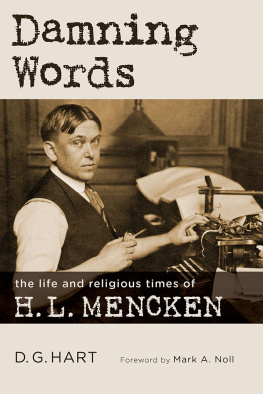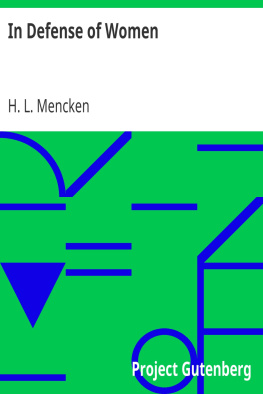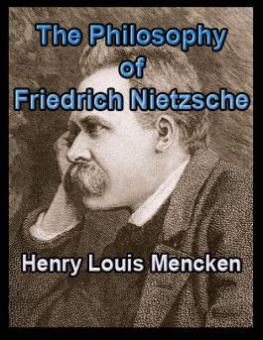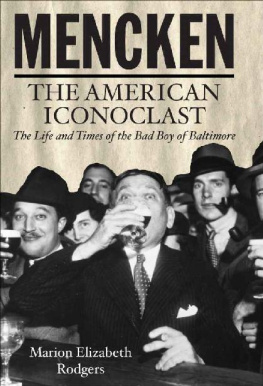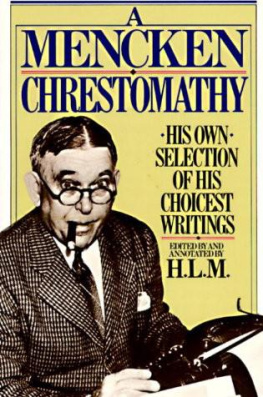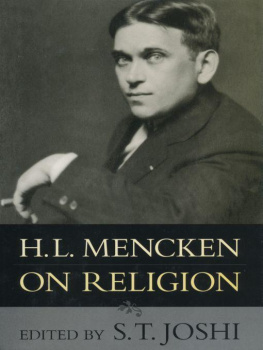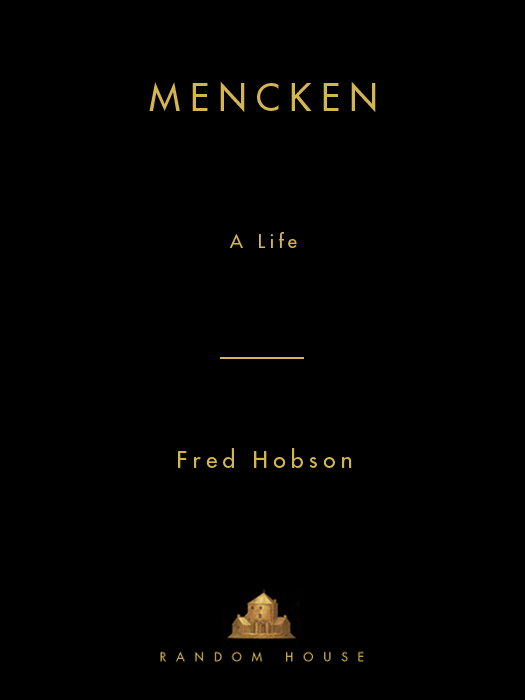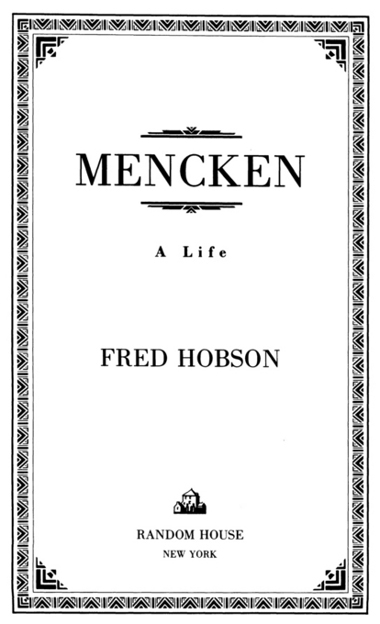Copyright 1994 by Fred Hobson
All rights reserved under International and Pan-American Copyright Conventions.
Published in the United States by Random House, Inc., New York, and simultaneously in Canada by Random House of Canada Limited, Toronto.
Owing to limitations of space, acknowledgments of permission to quote from unpublished and published materials will be found on .
Library of Congress Cataloging-in-Publication Data
Hobson, Fred C.
Mencken: a life/Fred Hobson.
p. cm.
eISBN: 978-0-307-82336-6
1. Mencken, H. L. (Henry Louis), 18801956Biography.
2. Authors, American20th centuryBiography. 3. EditorsUnited StatesBiography. I. Title
PS3525.E43Z467 1994 818.5209dc20 92-56820
[B]
v3.1
PRELUDE
THE ELUSIVE MENCKEN
T he American social and literary critic Henry Louis Mencken has experienced several deaths and resurrections over the past six decades. Called by Walter Lippmann in 1926 the most powerful personal influence on this whole generation of educated people, by the mid-1930s he had fallen so far, and so quickly, that he was sometimes referred to as the late H. L. Mencken. After experiencing a revival of popularity in the late 1930s and early 1940s with the publication of his autobiographical Days books and the monumental final edition of The American Language, he suffered in November 1948 a stroke so devastating that in the 1950s he referred to himself as having died in 1948. If we consider Mencken the author and editor, that was indeed the case since the stroke took the ability to read and write from this man for whom reading and writing seemed nearly everything.
When death, long anticipated and greatly desired, came at last in January 1956, it appeared that Mencken, at seventy-five, had indeed (to use his expression) reached the end of the chapter. But even then, if we consider Mencken as cultural force and object of national attention, such was hardly the case. For he had spent most of the last years before his stroke, in a very real sense, preparing to dieand then to live again as a writer through the release at stipulated times, after his death, of his correspondence, his diaries, and his recorded impressions of American life and letters in the first half of the twentieth century.
If to live again through his writing was Menckens intent, he has succeeded spectacularly. Following the opening in January 1971 of his massive literary correspondence in the New York Public Library, he was indeed resurrected as literary force, through his letters to and from nearly every major American writer of the first half of the centuryand through several books that drew heavily on that correspondence. If the letters helped to revive him, such was the case even more with the release in 1981, twenty-five years after his death, of other confidential materials, including the diary he had begun in 1930 at the age of fifty and kept until the month of his stroke in 1948. The publication of a substantial portion of the diary in 1989 created a furor that has yet to subsidean outpouring of reviews and essays, heated charges, and eloquent denials and defenses, revolving around the question of whether Mencken was or was not anti-Semitic, racist, misogynist, disloyal to friends and associates, and generally misanthropic.
That the politically insensitive H. L. Mencken would be resurrected a secondor thirdtime in an age of cultural and political correctness would have both amused and delighted him. He could not have anticipated the spirit of the age in which he would resurface, thus could not have guessed the exact form a response to his posthumous revelations would take. There is little doubt in my mind, however, that he expected the eventual publication of his diary and both expected and desired the publication of two final documents that he placed under lock and key for thirty-five years and that were at last released to researchers in January 1991. The most important of these final manuscripts, My Life as Author and Editor, Mencken hoped would be the most copious and accurate literary record of the twentieth century; if it was not altogether that, it was a workedited by Jonathan Yardley and published in 1993guaranteed both to enlighten and to offend. Although Mencken could hardly have been aware of the sensibilities of the audience that would receive his secret writings a half century later, it is clear that, until the end, he was seeking to reach that later audience, albeit at a time long after his death, when, as he once wrote a friend, there will be no more secrets, no more confidences. A posthumous revival is indeed an appropriate form of immortality for a man who professed to believe in no other kind.

One result of the release of thousands of pages of manuscripts over the past twenty years is the need for a new examination of Mencken and his role in American life and letters. That the role was a significant one is indisputable, although many have disputed the area in which his significance principally lies. Best known in the 1920s as editor of the iconoclastic American Mercury and author of the controversial Prejudices books, in the 1930s and 1940s he was known principally as autobiographer and philologist. He was also a dazzling stylistthe best prose [writer] in America during the twentieth century, Joseph Wood Krutch once remarkedand, when he chose to be, a spectacular public personality.
Both more and less than literary figure in the purest sense, not solely social and cultural critic, yet not precisely journalist, Mencken is as difficult to define now as he was in his own lifetime. He has been called variously, and with at least some justification, the American Voltaire, the American Swift, and the American Shaw. Other European figures from Rabelais to Dr. Johnson to Nietzsche have been used to explain him. If Mencken had never lived, Alfred Kazin has written, it would have taken a whole army of assorted philosophers, monologists, editors, and patrons of the new writing to make up for him. But to other Americans, particularly in the 1920s, Mencken was the most universally hated man in the United States.
It is no accident, then, that such a figure has been the subject of several biographies beforethe first of which, by Isaac Goldberg, appeared in 1925, when Mencken was but forty-five years old, and the most insightful and most reliable of which are those by William Manchester (1950) and Carl Bode (1969). But the most recent biography, Bodes, is now a quarter century old, and no biographer until the present has been able to take advantage of the recently released manuscript revelations, impressions, and judgments.
In these new materials we discover a private Mencken who had been largely concealed by the carefully constructed public persona, the buoyant and often bombastic Mencken. The material suggests a much more complex and ambiguous man, a darker figure than we had previously known. We see, particularly in the diary, a man preoccupied with illness andas he grew olderwith his own mortality. We see a man capable of expressing emotions he never expressed publicly: great joy and sorrow when he considers the life and early death of his wife, Sara Haardt; despair when he dwells on the deaths of his friends; great sadness when he sees the deterioration of his Hollins Street neighborhood in Baltimore. We are also given in the diary and in the recently released My Life as Author and Editor often devastating portraits of his contemporaries Theodore Dreiser, Sinclair Lewis, F. Scott Fitzgerald, and, to a lesser extent, William Faulkner and Thomas Wolfe. All, he believed, led disorderly lives, and were given to excesses of either the bottle or the flesh (or both) that not only damaged their literary careers but made them, much of the time, unsuitable companions. In expressing this disapproval of many of his friends and acquaintances, Mencken reveals a great deal about himself.


